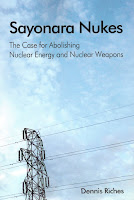When the Nuclear Village Comes to the Village

Academics who have studied the social transformations of the nuclear age note that it created the contemporary security state, first being focused on the communist Soviet enemy, then on the war on terror, and lately on problematic “adversaries” like Russia, China, Cuba, Venezuela, Iran and the DPRK. Other nations that went nuclear in response also turned themselves into security states with similar consequences.
The security state colonized our minds and produced a new normalized way of thinking about how society should be organized. One of the best studies of the social impacts of the nuclear age is Joseph Masco’s 2006 book The Nuclear Borderlands. He described “radioactive nation-building,” by which he meant “the long-term effects of participating in national-cultural logics that mobilize resources in the name of security and community, but that do so in ways that are unsustainable and that create both social and material toxicity. ” [1]
We might also say this social and material toxicity is a contemporary dystopia, a nightmarish military and security complex that everyone would like to unwind, which might be easier to do if it weren’t also the basis for the economy that employs millions of people. No one knows how to wake up from the nightmare. The only consolation prize comes from those aspects of the situation that sometimes provide some comic relief. A recent episode uncovered by the intrepid reporters of Le Canard Enchaîné revealed what happens when the national nuclear project meets village-level politics:
She takes her daily stroll in freedom
Le Canard Enchaîné, 2017/11
Mandres-en-Barrois is a village in the Meuse region, as tranquil as can be. 150 inhabitants. But they have a problem. Bure is next door. Because their mayor ceded 220 hectares of the Lejuc forest for the project that will be the largest underground nuclear garbage can in France, a horde of activists have permanently installed themselves there to keep watch on the forest. It must be said that ANDRA (Agence nationale pour la gestion des déchets radioactifs) started to illegally pave and tear up this forest. In May, the appeals court in Nancy ordered ANDRA to stop this work.
There is a large police presence in the forest watching the activists, which is also there in permanence. This is definitely a major surveillance and intervention: a Pandora’s box as two inhabitants recently discovered.
The officers are rather poor physiognomists. They keep stopping the same people over and over again, not only activists but also the villagers, people as innocent as can be! Many of them have gone to see the mayor about this. He has given them a written attestation of their good character, which he has warned them to always keep on their person if they want to be able to move freely in the area. When Le Canard asked the mayor how many attestations he had written, he barked, “Are you the police?” then hung up. We doubt that he will soon be writing the same attestations for the wicked activists.
ATTESTATION
I, Xavier LEVET, mayor of the village of Mandres en Barrois,
certify that Madame ____________ is a resident of Mandre
who takes a stroll each day and there is no reason to interfere with her movements.
Signed in Mandres en Barrois, November 22, 2017
Note
[1] Joseph Masco, The Nuclear Borderlands: The Manhattan Project in Post-Cold War New Mexico (Princeton University Press, 2006) 213.
Note
[1] Joseph Masco, The Nuclear Borderlands: The Manhattan Project in Post-Cold War New Mexico (Princeton University Press, 2006) 213.









No comments: